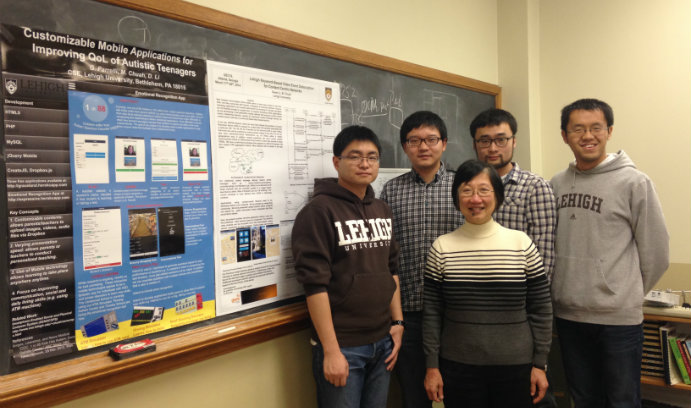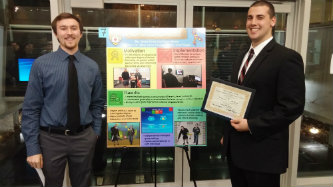Wireless mobile healthcare—and more

Mooi Choo Chuah (center), shown here with her graduate students, was cited for her work with wireless network systems and protocol design when she was named a Fellow of IEEE.
Mooi Choo Chuah laughs as she waves at the stacks of paper piled high on the desk, chairs and floor of her office.
“I enjoy doing research,” she says. “I’m interested in many interdisciplinary topics that solve real problems. Whenever a problem interests me, I spend tons of time reading up new material so that I can learn how I can contribute to this new area.”
Chuah, a professor of computer science and engineering, was recently named a Fellow of IEEE (the Institute of Electrical and Electronics Engineers), one of the highest honors for people in her field.
IEEE, which calls itself the world’s largest organization for the advancement of technology, officially cited Chuah for her accomplishments in wireless network systems and protocol design.
Unofficially, one suspects that IEEE was equally impressed with the scope of Chuah’s work and the energy she brings to it.
Chuah joined the faculty in January 2004 after 12 years with Bell Labs. She holds 62 U.S. patents and 15 international patents, most of them for innovations with wireless LAN (Local Area Network)-based systems, and for features that enable quality of service, mobility management in WLAN and 3G systems. She also designs security and disruption-tolerant network solutions for wireless and internet-based systems.
An expanding research arena
In the past few years, Chuah has expanded her research areas to include the electrical power grid, mobile visual search and, perhaps most notably, mobile healthcare applications.
“I believe it’s important for researchers to evolve,” she says. “That opens up more opportunities to contribute to new problems.”
One app that Chuah and her students developed, WiFiTreasureHunt, enables users to interact with the computer on their cell phones and to compete with their friends, while taking part in a real-world, location-based treasure hunt. The app can be extended to measure heart rates and to award coupons for healthy snacks as users race from one treasure site to the next.
Chuah and her collaborators from the Stevens Institute of Technology recently designed a Gait-Based User Verification System, which can be used to verify that the walking steps taken by a user actually comes from that user. When, for example, users are rewarded with coupons for achieving exercise goals, it is important that the user be credited with the activity, and not friends who might be recruited to log more steps to reach the milestone for receiving a reward.
“Our scheme is very robust,” says Chuah. “It recognizes only my gait, and it rewards only my exercise accomplishments, and not someone else’s.”
A ministry to kids with autism
Chuah has taken a special interest in the needs of children with autism spectrum disorder (ASD), which impairs one’s ability to interact with others and to communicate verbally and nonverbally. To gain a firsthand knowledge of ASD, Chuah has joined an autism ministry at a local church and also consulted with faculty members in Lehigh’s College of Education and Centennial School.
“I try to go and observe the problem I’m trying to solve,” she says, “so that I can gain a better understanding of it.”
She also enjoys working with undergraduate students. This fall semester, two computer science students, Jesse Kurtz ’15 and Kyle Moore ’15, under Chuah’s supervision, recently designed Kinect for Kids, a game using a Kinect sensor that allows kids with ASD to play Xbox-like and Wii-like games. Their work won the Peers’ Choice Award this month at the senior design project competition among computer science students.
X-box and Wii games typically run too fast for children with ASD, says Chuah. Kinect for Kids is customizable; its speed can be set according to a user’s ability. Sensors provide the system with skeletal data enabling it to track the movements of a user. Kurtz and Moore’s initial prototype allows students to collect stars or dragons on the screen to earn points. The system can be enhanced to let users take part in visual-based sports such as badminton, tennis and skiing.
All of the healthcare apps designed by Chuah and her group are free and can be downloaded from her website at http://carina.cse.lehigh.edu/graceland/
Chuah, who directs Lehigh’s Laboratory of Wireless Infrastructure and Network Security, has four Ph.D. students, two master’s degree students and a number of undergraduates in her research group. Her research has been supported by the National Science Foundation, the Pennsylvania Infrastructure Technology Alliance, the Army Research Laboratory and DARPA (the Defense Advanced Research Projects Agency).
Story by Kurt Pfitzer
Posted on:


